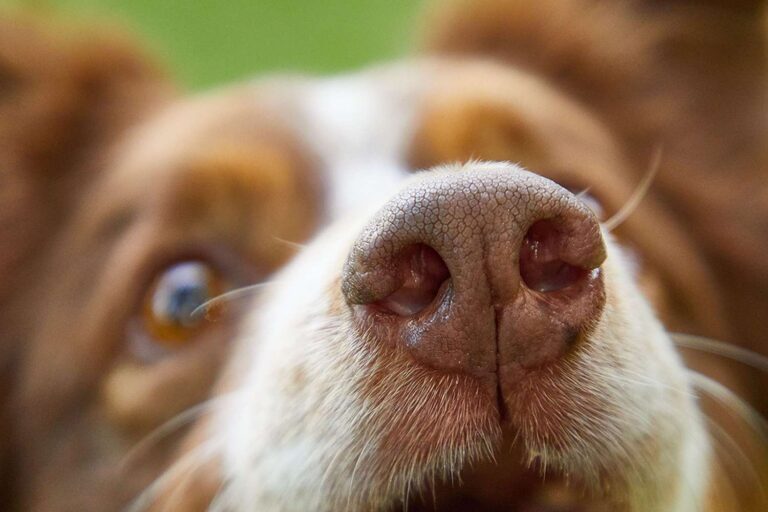Dogs sniff private areas due to natural curiosity and to gather information about you and others. It’s natural for dogs to sniff private areas, as it’s a way for them to gather information and understand their surroundings.
Dogs have a keen sense of smell and use it to learn about their environment and the people in it. This behavior is often their way of getting to know you or other individuals, and it’s not meant to be invasive or disrespectful.
Additionally, dogs have a specialized part of their brain dedicated to processing smells, so it’s a normal and instinctive behavior for them. Understanding and respecting your dog’s natural instincts can help you build a stronger bond and communication with your furry friend.

Credit: www.rd.com
The Nose Knows: Canine Scent Detection
Did you ever wonder why your dog is constantly sniffing around your private area? Dogs have an incredibly powerful sense of smell, with up to 300 million olfactory receptors in their noses, compared to a human’s mere 5-6 million. This exceptional ability allows them to interpret the world through scent, picking up on subtle changes and nuances that humans are completely unaware of. This explains why dogs are so adept at detecting emotions, detecting diseases, and even identifying individuals based on their unique scent. Their olfactory abilities far surpass our own, making their behaviors and actions quite different from ours. Understanding the power of a dog’s sense of smell also helps us comprehend why they are so drawn to sniffing private areas. It’s a behavior rooted in their innate olfactory curiosity and should be seen from their perspective rather than as an invasion of personal space.
Why Dogs Sniff Humans
Canine communication via scent: Dogs have an extraordinary sense of smell, allowing them to communicate and gather information through sniffing. When a dog sniffs a human’s private area, they are likely trying to learn about the person’s scent, which is a form of communication for dogs.
Seeking information and familiarity: Dogs use their sense of smell to gather information about their surroundings, including smelling humans to establish familiarity and learn about their emotions and health.
Bonding and social behaviors in dogs: Canine behavior experts suggest that sniffing is a means for dogs to build trust and develop a bond with humans, showcasing social behaviors and establishing a connection.
Biological Instincts Behind The Behavior
Dogs sniffing human private areas may be due to their biological instincts. The role of pheromones in dog-to-human interactions is significant, as dogs use scent to communicate and gather information. They may be naturally curious about human reproductive status, leading them to sniff private areas to gather information. Moreover, dogs have shown an ability to detect medical conditions through scent, indicating that their sniffing behavior could be a means of detecting health conditions in humans. The ability of dogs to detect medical conditions through scent has been widely recognized, suggesting that their behavior could be driven by an instinct to gather information about their human companions. Understanding these biological instincts can provide insight into why dogs exhibit this behavior.
Sniffing And Dog Etiquette
Dog behavior, including sniffing, is a natural instinct stemming from their keen sense of smell. It is their way of gathering information and communicating with their environment. Normalizing certain behaviors in the canine world is important to understand that sniffing is a dog’s way of exploring and understanding the world around them. It reflects their domestication and interaction with humans. Teaching your dog about personal boundaries is key to managing their behavior. Encouraging positive interactions and setting consistent boundaries can help in addressing this behavior in a way that is comfortable for both the dog and its owner.
Managing Your Dog’s Sniffing Habits
Managing your dog’s sniffing habits is essential to ensure comfortable social interactions. Utilize training techniques to minimize unwanted sniffing. Consistent, positive reinforcement can create desirable behaviors in social situations. Seeking professional help for your dog’s behavior is crucial if the sniffing habits become persistent and challenging to manage.
Frequently Asked Questions For Why Does My Dog Keep Sniffing My Private Area
Why Does My Dog Sniff My Private Area?
Dogs use their sense of smell to gather information about you and other animals. It’s a natural behavior and doesn’t necessarily indicate anything inappropriate. If you’re concerned, it’s best to consult with a veterinarian to rule out any medical issues.
What Does It Mean When A Dog Sniffs A Person’s Private Area?
Dogs sniffing private areas is part of their natural curiosity and communication. It’s a way for them to gather information about you and other animals. It’s best to ensure that your dog is well-trained and socialized to avoid any awkward situations.
Can I Stop My Dog From Sniffing People’s Private Areas?
Training and socializing your dog are key aspects of preventing unwanted sniffing behaviors. It’s essential to establish boundaries and use positive reinforcement to redirect their attention. Professional trainers can provide guidance on how to address and modify this behavior effectively.
Conclusion
It’s natural for dogs to engage in sniffing behavior, including your private area. Understanding your dog’s behavior and addressing any underlying health or behavioral issues is important. Providing proper training and socialization can help manage this behavior. Remember, patience and consistency are key in shaping your dog’s behavior.



